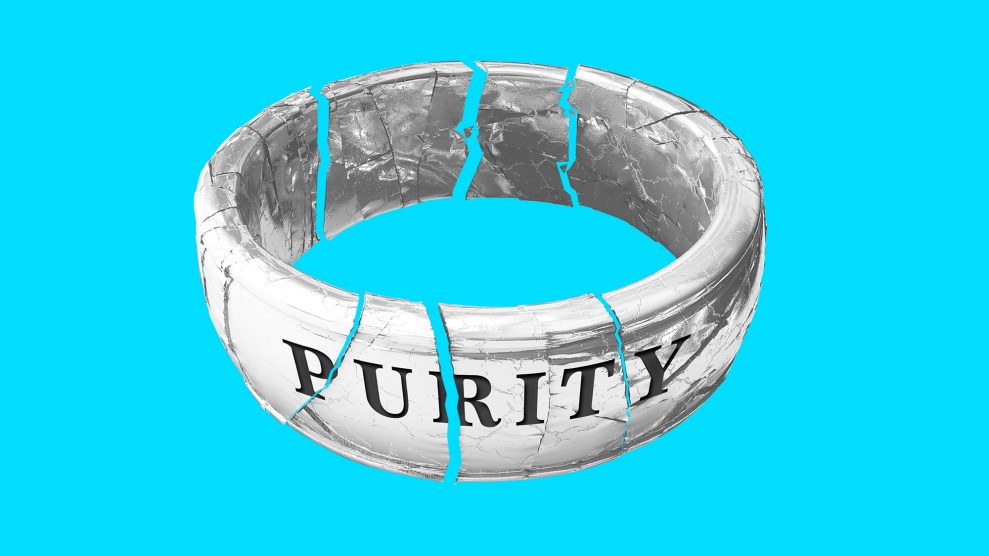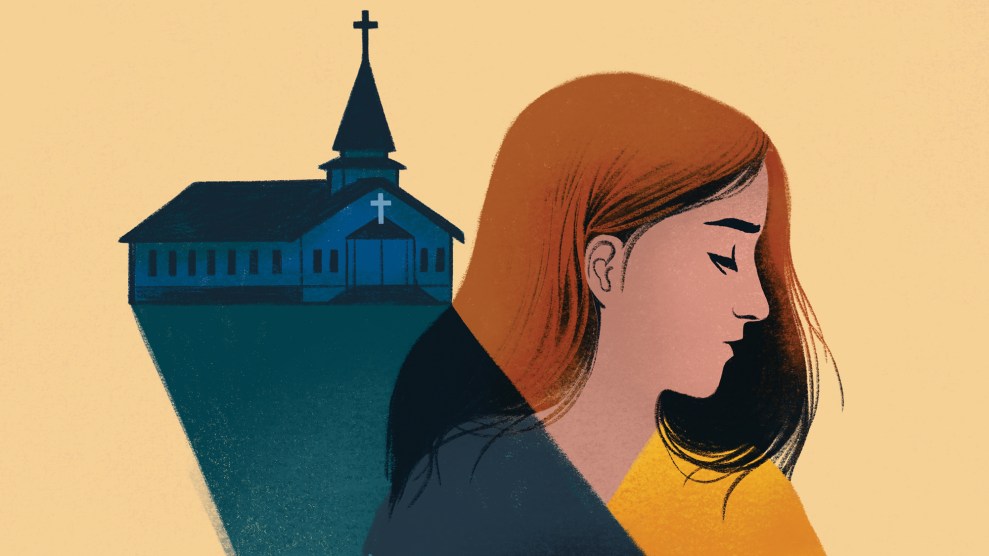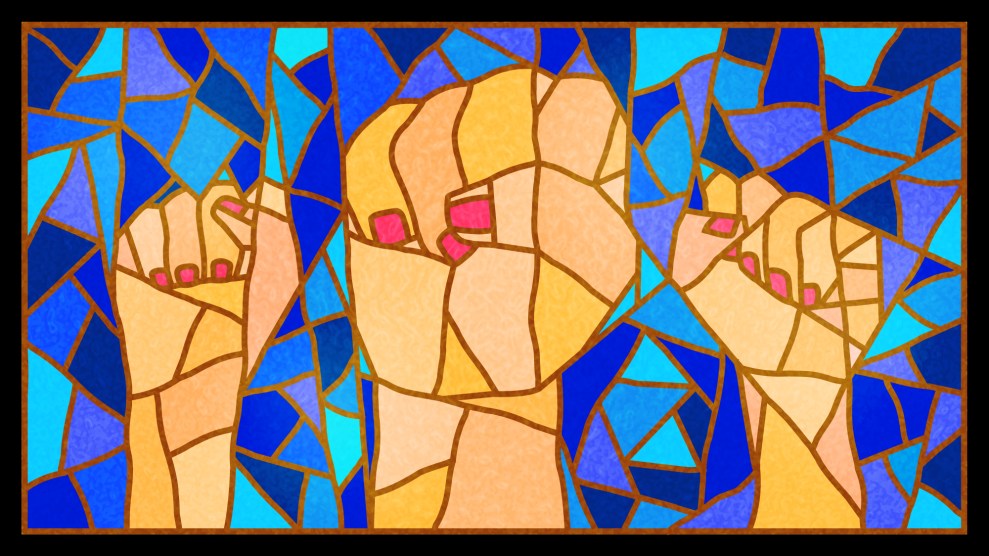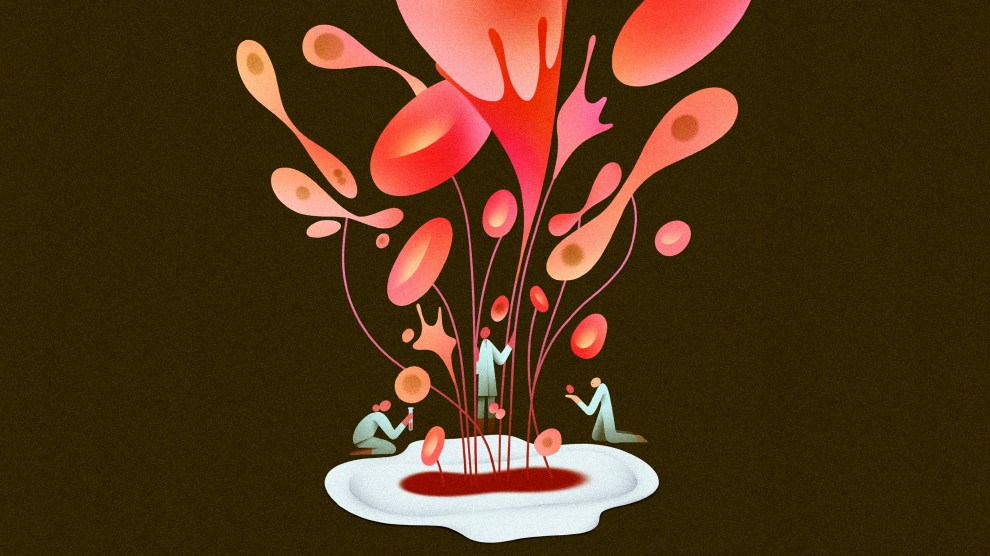
Mother Jones illustration; Getty
Purity culture, which I’ve written about for Mother Jones over the past few years, is facing a growing challenge, as more and more women come forward to talk about how they’ve been harmed by the way evangelical communities emphasize sexual purity above all else. Enter Linda Kay Klein. Her debut book, Pure: Inside the Evangelical Movement That Shamed a Generation of Young Women and How I Broke Free, is part memoir, part collection of character vignettes, part deeply researched dive into the purity industry—the lucrative concerts, books, and rings that promote the ideology—and the religious mechanisms behind it. It’s not the first book written about the purity industry—one of the more notable works in this vein is Jessica Valenti’s The Purity Myth, which Klein cites in Pure—but as a Christian herself, Klein is in a unique position to conduct a thorough investigation into the aftereffects of believing one’s virginity is the most important thing about them.
In Pure, Klein chronicles her personal journey as she struggles to disentangle herself from the shame she learned growing up in the evangelical church. While she left the church when she was 21 years old, Klein writes that about six months later she began to reclaim her faith on her own terms, separate from evangelicalism. Klein’s own narrative is complemented by interviews with more than 80 people who were also subjected to purity culture within evangelicalism. These stories, from women who experienced the intersection of purity culture and sexual assault; a trans man who still wrestles with his sexuality even after coming out; and women who have opted to “date Jesus,” explore a wide range of the consequences of this culture. Klein recently talked to Mother Jones about the power she found in storytelling, whether there’s any hope of the church breaking up with purity culture, and why evangelicals are so obsessed with sex.
Mother Jones: How did you decide to write this book?
Linda Kay Klein: It was something I came to slowly. This journey started with my feeling utterly and absolutely alone and broken and like I would never be healthy or have a healthy relationship. I had left the evangelical church, and nobody in the secular world I was talking with had any of the experiences I was having around a deep, deep sexual shame and fear and anxiety—which for me was manifesting physically. I had already rejected the church’s sexual shaming, and the fact it was still controlling my life in many ways was very scary to me: realizing how deeply I had internalized it, and not knowing how to truly be free.
For me, the healing only became possible when I started to talk to my childhood girlfriends, and then sitting with my jaw dropped to the floor as they told me very, very similar stories from their own lives—of sexual fear and shame and anxiety that were manifesting physically in ways that mimicked classic PTSD. The realization that I wasn’t alone really was the beginning, because if I wasn’t alone, if I wasn’t the only one, then that meant I wasn’t the problem—the problem was something that was taught to us. That first realization is what led me to start this journey in the first place, which started with me going back to my hometown and spending a year interviewing girls I’d been raised with in my youth group.
When I first started doing the interviews, I knew that the desperate need to know I wasn’t alone was being mirrored in their stories. We all had this feeling we were alone because we hadn’t been telling these stories; we had been locking them deep, deep inside ourselves. So experiencing the release over and over, as I told my story and heard my story told back to me, and hearing that same relief in their voices as they heard their story told back in my own, made it clear I needed do something to get the stories out there.
MJ: Yeah, that’s something I’ve been blown away by—the responses to my own writing about purity culture and just the sheer number of people who are struggling with the aftermath.
LKK: Absolutely. It’s why even though this journey has been remarkably difficult, I could never stop. I never stopped having people reach out to me; there were years I was doing formal interviews, and there were years I was just answering phone calls from people who said, “Can you please have coffee with me? Because I read something and I need to talk to you,” or, “Can you please talk to my partner, because I heard you’re gathering these stories, and my partner has some issues, and we don’t know what to do.” Every time it became difficult and I might have been tempted to turn away from doing this project, I wasn’t able to, because of the responsibility that was placed on my shoulders with the sheer number of stories people had shared with me.
MJ: Can you talk a little bit about what made this such difficult work for you?
LKK: In the book, I write about having been a ninth-grade [Bible study] girls group leader, and a girl comes to me and says, “This other youth leader gave me this sexually shaming message, what should I do? Should I trust them? Should I believe them?”
I was at a point in my life then where I was able to say, “What do you think about that? Do you take that seriously, does that align with your lived experience?” But I wasn’t at a point where I was able to stand up and say, “No! That youth leader is telling you something horrible, it’s going to hurt you, if my life is any indication.” The distance between that person and the person I am now, that is willing to tell her story and share the stories of others, was not an easy road. I had a lot of fear around doing what I had been told never to do, which is in any way critique the evangelical community because people would then turn away from God, and there could be eternal consequences to your critiques.
MJ: Do you think there is a reckoning happening right now in Christianity around purity culture?
LKK: There has always been a push and pull between evangelicals on the ground and evangelical institutional leaders. I feel a deep readiness among many evangelicals on the ground to address this; I’m just not hearing evangelical leaders echo that readiness. I do hear some evangelicals standing up and saying, “This has to change, and we’re going to help create that change today.” I do also hear some people saying, “Yes, there is shame, and yes, that is a problem, and the reason you’re experiencing shame is because you haven’t lived purely, and all you have to do to be free from shame is to be more pure.” In other words, I hear some people reiterating the same shaming message—one that is acknowledging the shame—but instead of taking responsibility for a messaging that created that shame, they’re blaming people for their shame and sending people further down the shame cycle. If we really want to see tremendous healings, that is going to be something the groundswell creates. That is going to be people on the ground standing up and saying, “You know, this is my story too, and I refuse to be silent any longer.” The more the people on the ground do that, the more the institutional leaders will be responsive.
MJ: So why do you think evangelicals are so obsessed with sex in the first place? Why does that particular sin carry so much gravity?
LKK: So first of all, I will say this is deeply, deeply embedded into Christianity as a whole. That routes all the way back to Greco-Roman culture. So it goes a lot deeper than evangelicalism.
In terms of why evangelicals have hyper-focused on this issue…it feels difficult to say, but what I can say is that a consequence of their hyper-focus on this is that it creates a tremendous amount of control over people’s lives. When you control what somebody thinks about when they are in private, when they’re in their most intimate moments, you control the most vulnerable part of them. That’s a deep and powerful control. I don’t know anyone who would point to that as a reason for it, but it is a consequence of that hyper-focus.
MJ: In the book, you write about a friend of yours who was raped and shamed for her assault by her family. Can you talk a little about how evangelical purity culture creates a sense of shame and secrecy around sexual assault?
LKK: First of all, there is this rhetoric you’re familiar with, that girls and women are responsible for maintaining the sexlessness of all people, and if there’s any sexual expression of any kind, whether that’s abuse or consensual, it is because the girl or the woman allowed it to happen. That sort of rhetoric already creates a tremendous amount of self-blame people experience when they’re abused and assaulted, and that shame people feel automatically leads to silence because that’s just what shame does—shame creates silence.
Many of us have learned that if you do come forward, you’re going to be blamed or asked these shaming questions like “What were you wearing?” or “What were you doing there so late?” Some people have actually told me they find those conversations to be more traumatizing than the violence itself, because they could point to the violence as something that happened, whereas a larger shaming from the community they were taught was there to protect them is harder to contend with.
Consensual sex in the evangelical community is shamed and nonconsensual sex is silenced. So the last thing is that many people feel if they do come forward, nothing will happen to protect them or others, and they will have gone through the re-traumatization for nothing.
MJ: After talking to so many women about their experiences in evangelical purity culture, do you feel we have an epidemic of trauma and sexual dysfunction in this sphere?
LKK: I do. An epidemic affects many people. This is definitely affecting many people. An epidemic is spread from person to person, and that’s exactly how this spreads—shamed people shame people, particularly for those things they were shamed for themselves. So this shaming is passed down from peer to peer, from parent to child, from leader to student.
MJ: Can you tell me a little bit about how you’ve been able to preserve your faith while turning a critical eye toward purity culture? Were there moments when you considered fulling breaking with Christianity?
LKK: When I left evangelicalism, I was under the impression I was losing everything, including my faith, because I had been taught there was only one Christianity. It was an all or nothing package—you believed it all, and you went to church every Sunday, and you read these books, and you listened to this music, and you spent time with these people. You were in or you were out, and there was no middle ground. In the moment I decided to leave, I turned on my computer and wrote down the phrase, “My life has no meaning,” because my entire life was being an evangelical Christian, and my life purpose was sharing evangelical Christianity with others.
What I discovered very quickly was though I had left, God had not left me. I know not everyone is a believer, but I felt as much of the holy presence around as I ever had. For a period of time I wouldn’t allow myself to pray, but it didn’t take me long to begin to pray again and to begin to be in a relationship with God. The reason I share that is to say my faith actually didn’t go anywhere; I still had a deep faith and felt a deep presence. And so that was big for me, to realize something I thought I could only access within a particular subculture was so much bigger than that subculture. It was many, many more years I had to contend with my faith because I had been raised to believe there was only one Christianity, but I started to interact with a lot of different types of Christians. That was very eye-opening, to realize there were passionate Christians who did not see sexuality and spirituality as mutually exclusive, who were not shaming, who, on the contrary, talked about all the things I love the most about Christianity, like unconditional love and standing up for everybody. It was a slow progression to reclaiming my faith.
MJ: What have I not asked you that I should have?
LKK: I would like to talk a little bit about healing. For me, my healing journey was all about the story exchange I’ve been doing for the last four years, talking to people. I’ve really come to believe very strongly that’s the only way any of us heal, and the more of us to tell our stories, the more difficult it is for those stories to be dismissed. I think it’s also the way to create change. But moreover, as a first step, it’s how we heal, by coming together and realizing we aren’t alone, and then entering into this sacred space of story with others, so more people realize they aren’t alone. That’s really, really important, and why I started this organization called Break Free Together, where I’m essentially just putting out different ways for people to share their stories and be in community with one another, and for us to begin to have conversations about the many, many ways sexual shaming impacts us because it touches us on so many levels.
The last thing I would like to add is that this isn’t just about evangelicals. As much as these teachings are deeply embedded in evangelical culture, they can be found in many different Christian expressions, and many different religious expressions and secular expressions. In the church, I grew up learning there were two types of girls: those who are pure and those who are impure. In secular society, you can talk about a good girl, or a bad girl, and we’re talking about the same thing—we’re talking about the community’s perception of her sexuality, so these ideas are baked into life. By understanding how sexual shaming impacts evangelicals who received a really extreme dose of it through the purity movement and the purity industry, we can start to get a sense of how many of us are being impacted by sexual shaming. So it’s part of something larger.
This interview has been edited and condensed.















